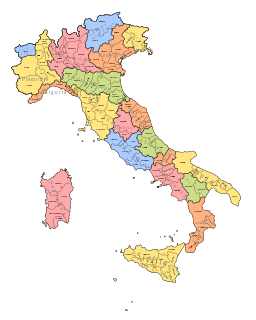Related Research Articles

The provinces of Italy are the second-level administrative divisions of the Italian Republic, on an intermediate level between a municipality and a region. Since 2015, provinces have been classified as "institutional bodies of second level".

The languages of Italy include Italian, which serves as the country's national language, as well as numerous local and regional languages, most of which, like Italian, belong to the broader Romance group. The majority of languages often labeled as regional are distributed in a continuum across the regions' administrative boundaries, with speakers from one locale within a single region being typically aware of the features distinguishing their own variety from one of the other places nearby.

The Liberal Democrats, whose complete name is Liberal Democrats for Renewal, is a liberal and centrist political party in Italy.

The judiciary of Italy is a system of courts that interpret and apply the law in the Italian Republic. In Italy, judges are public officials and, since they exercise one of the sovereign powers of the State, only Italian citizens are eligible for judgeship. In order to become a judge, applicants must obtain a degree of higher education as well as pass written and oral examinations. However, most training and experience is gained through the judicial organization itself. The potential candidates then work their way up from the bottom through promotions.

The Italian electoral law of 2015, also known as Italicum, was an Italian electoral law passed in 2015. The law, which came into force on 1 July 2016, regulated only the election of the Chamber of Deputies, replacing the previous electoral law of 2005, which had been ruled partly unconstitutional by the Constitutional Court of Italy in December 2013. It provided for a two-round system based on party-list proportional representation, including a majority bonus and a 3% election threshold. Candidates would have run in 100 multi-member constituencies using open lists. The largest party which won over 40% of the vote would automatically win a majority of seats; if no party won 40% of seats, a second round of voting would be held between the two largest parties, with the winner of the second round winning a majority of seats. The name "Italicum" was coined in 2014 by Democratic Party secretary and later Prime Minister Matteo Renzi, who was one of the legislation's main proponent.

The South American Union of Italian Emigrants is an Italian political party representing Italian minorities in South America, especially Argentina and Brazil.

The law of Italy refers to the system of law across the Italian Republic. The Italian legal system has a plurality of sources of production. These are arranged in a hierarchical scale, under which the rule of a lower source cannot conflict with the rule of an upper source.

Maurizio Landini is an Italian trade unionist. Since January 2019, he is the General Secretary of CGIL. He was also former General Secretary of FIOM from 2010 to 2017. Landini is considered a socialist and is famous for his populist political style.

Forza Italia is a centre-right political party in Italy, whose ideology includes elements of liberal conservatism, Christian democracy, and liberalism. FI is a member of the European People's Party. Silvio Berlusconi is the party's leader and president, while Antonio Tajani functions as vice president and national coordinator. Other leading members include Elisabetta Casellati, as well as ministers Renato Brunetta, Mara Carfagna, and Mariastella Gelmini.

New Centre-Right was a centre-right political party in Italy.

Maria Elena Boschi, is an Italian lawyer and politician, member of the Chamber of Deputies since 2013.

The Liberal Popular Alliance, whose full name was Liberal Popular Alliance – Autonomies, was a centrist and liberal political party in Italy. ALA members were known as Verdiniani, from the name of their leader Denis Verdini, who was formerly a long-time member and national coordinator of three successive centre-right parties led by Silvio Berlusconi until July 2015, when he broke with Berlusconi in order to support the government led by Matteo Renzi, leader of the centre-left Democratic Party.

A constitutional referendum was held in Italy on 4 December 2016. Voters were asked whether they approved a constitutional law that amends the Italian Constitution to reform the composition and powers of the Parliament of Italy, as well as the division of powers between the State, the regions, and administrative entities.

Basta un Sì is an advocacy group which campaigns in favour of the constitutional reform, proposed by Matteo Renzi's government and approved by the Italian Parliament in the Spring of 2016, in the December 2016 constitutional referendum. The group is actively supported by the Democratic Party.
This page lists individuals and organisations who publicly expressed an opinion regarding the 2016 Italian constitutional referendum.

The 2017 Democratic Party leadership election was an open primary election held on 30 April 2017. The three candidates were Matteo Renzi, former Prime Minister and party secretary until February 2017, Michele Emiliano, President of Apulia, and Andrea Orlando, the Minister of Justice. Renzi was elected by a landslide 70%, and appointed Maurizio Martina as his deputy secretary.

Paola Taverna is an Italian politician for the Five Star Movement, who has been a member of the Senate of the Republic since the 2013 Italian general election. She has subsequently been elected Vice-President of the Senate as of March 2018

A constitutional referendum about the reduction of the size of the Italian Parliament was held in Italy on 20 and 21 September 2020. Initially scheduled to be held on 29 March, the referendum was postponed following the spread of the coronavirus pandemic in Italy and subsequent lockdown.
This page lists individuals and organisations who publicly expressed an opinion regarding the 2020 Italian constitutional referendum.
A five-part referendum will be held in Italy on 12 June 2022. The vote will decide on the repeal of five articles or decrees relating to the field of justice. Each of the five questions is submitted to this abrogative referendum on the proposal of nine regions governed by the Centre-right coalition. Local elections will be held on the same day.